Discover Inside Matters
Inside Matters

Inside Matters
Author: Dr James McIlroy
Subscribed: 15Played: 209Subscribe
Share
© Copyright 2022 All rights reserved.
Description
The gut health show – conversations with the most forward-thinking minds in health, fitness, science, nutrition and business. In-depth discussions about how our gut microbiome impacts our health, well-being, mood and more.
Inside Matters was conceived by microbiome expert Dr James McIlroy as a platform to raise awareness of the importance of the gut microbiome. Our aim is to inspire and educate listeners around the world about the importance of gut health, equipping them with the knowledge they need to transform their lives for the better.
Inside Matters was conceived by microbiome expert Dr James McIlroy as a platform to raise awareness of the importance of the gut microbiome. Our aim is to inspire and educate listeners around the world about the importance of gut health, equipping them with the knowledge they need to transform their lives for the better.
69 Episodes
Reverse
Dr Debra Silberg joins Inside Matters for a deep, wide-ranging conversation on gut health, drug development, and the future of microbiome therapeutics.
Dr Silberg is the Chief Scientific Officer at Beyond Celiac, a former global clinical leader at Shire/Takeda and AstraZeneca, and one of the most respected figures in GI medicine and microbiome science.
In this episode, we explore:
• How she moved from basic science to medicine to pharma leadership
• Why the GI field needed so much research — and how it transformed
• The real science behind ulcers, H. pylori, and the Barry Marshall story
• What she teaches in her popular “Understanding Your Gut” course
• Prebiotics vs probiotics — what actually matters
• The truth about gluten, celiac disease, gluten sensitivity and rising incidence
• The microbiome’s role in inflammation, autoimmune disease, mental health & IBS
• Whether microbiome drug development is finally turning a corner
• Why the gut–brain axis may be the most exciting frontier in medicine
Dr Silberg also shares insights from her work with Finch Therapeutics, her role at Beyond Celiac, and her experience advising the team at Biotics.
If you’re interested in gut science, the microbiome, diet, or how modern medicines are built from the ground up, you’ll get a huge amount from this conversation.
Be well, trust your gut — and thanks for listening.
00:00 Introduction to Dr Debra Silberg
00:54 Dr Silberg's Career Journey
02:26 Insights on Gut Health and Microbiome
04:05 Understanding GI Diseases and Treatments
07:41 The Role of Diet in Gut Health
15:59 Celiac Disease and Gluten Sensitivity
25:04 Exploring the Microbiome
27:43 Exploring Therapeutic Approaches to the Microbiota
31:36 Challenges in Microbiome Drug Development
34:22 The Gut-Brain Connection and Mental Health
39:13 Transitioning from Academia to Pharma
41:45 Insights into Drug Development and Success Stories
44:55 The Long Journey of Drug Development
52:01 The Role of AI in FDA Reviews
55:04 Quick Fire Round: Future of Microbiome Research
You must not rely on the information in this video as an alternative to medical advice from your doctor or other professional healthcare provider. If you have any specific questions about any medical matter you should consult your doctor or other professional healthcare provider. If you think you may be suffering from any medical condition you should seek immediate medical attention. You should never delay seeking medical advice, disregard medical advice, or discontinue medical treatment because of the information in this video.
In this episode, Dr James McIlroy chats with Dr Tanya Mongan, clinical associate professor and gastroenterology consultant at the University of Nottingham. Dr Mongan specialises in gut health, particularly the gut–brain connection and faecal microbiota transplantation (FMT).
She talks us through the current state of FMT, why it works so well, and how it’s becoming an increasingly important treatment for conditions like inflammatory bowel disease. We also explore her cutting-edge research into microRNA-based medicines—a new field examining tiny molecules that can help protect the gut and may one day be used to treat conditions linked to an unhealthy microbiome, including cystic fibrosis and neurodegenerative diseases.
This episode breaks down the complexities of the microbiome in an easy-to-understand way, covering everything from the limits of current testing to the promise of personalised gut treatments. Dr Mongan also shares insights into exciting new tools such as organ-on-chip models, nano-delivery systems for microRNAs, and even zebrafish models used in gut research.
If you want to understand where gut science is heading, what’s real and what’s hype, and how future therapies may become more precise and personalised, this is a must-listen.
Chapter Markers
00:00 Introduction to Dr Tanya Mongan and gut health
01:51 Has the microbiome “bubble” burst?
03:45 The big challenges in microbiome science
06:13 What the future of microbiome testing could look like
12:45 Understanding faecal microbiota transplantation (FMT)
19:22 How FMT works and what current research shows
26:29 Why the microbiome is so complex
34:57 MicroRNAs: a new frontier in gut health
37:41 Where microRNAs come from
38:18 How microRNAs help protect the gut
39:00 Why delivering microRNAs is difficult
39:19 Nano-formulation: new ways to deliver microRNAs
40:37 The advantages of organ-on-chip models
42:02 Personalised “gut avatars”
43:58 Zebrafish and other models used in gut research
49:27 Clinical applications and future directions
53:17 Microbiome therapy and FMT in clinical practice
56:57 The future of microbiome research and treatment
01:01:23 Diet, supplements, and the microbiome
01:04:34 Weight-loss drugs and how they affect the microbiome
01:07:52 Fascinating facts about the microbiome
01:09:24 Final thoughts and wrap-up
Revolutionising Liver Health: The Link Between Gut Health, Genetics, and Lifestyle
In this episode, we dive deep into the intricate connections between liver health, gut health, genetic predispositions, and lifestyle factors. Our guest, Gary, a seasoned physician and entrepreneur, shares his extensive experience from pioneering liver disease research in the 90s to running a successful metabolic clinic focused on functional medicine today. Learn about the evolution of understanding fatty liver diseases like NASH and MASH, the impact of processed foods, and the groundbreaking treatments emerging, including the promising effects of GLP-1 therapies. Gary also discusses the pivotal role of a clean diet, exercise, and quality sleep in managing liver health, and the challenges of implementing these changes in a clinical setting. Don't miss this insightful conversation packed with practical advice and forward-thinking approaches to improving liver and overall metabolic health.
00:00 The State of Food Quality in America vs Scotland
02:39 Understanding Fatty Liver Disease: Past and Present
05:29 Genetic and Environmental Factors in Fatty Liver Disease
08:13 The Evolution of MASH: From NASH to Metabolic Health
10:46 Emerging Treatments and Medications for Liver Disease
13:35 The Role of GLP-1s in Managing Liver Health
16:18 The Gut–Liver Connection: A Historical Perspective
19:07 Building a Successful Liver Clinic: Insights and Challenges
33:52 Understanding Metabolic Health and Genetic Testing
35:13 The Importance of Gut Health
37:39 Transforming Workplace Wellness Initiatives
45:48 The Future of Functional Medicine
51:30 Addressing Liver Health and Alcohol Consumption
Takeaways
The quality of food in America is declining, impacting health.
Fatty liver disease is increasingly common, especially among those with higher body mass indexes.
Genetic predisposition plays a significant role in liver disease.
MASH is a critical condition that combines fatty liver with inflammation.
Advancements in GLP-1 medications show promise for treating liver disease.
Gut health is essential for overall wellness and liver health.
Guy Neff's journey reflects a blend of medicine and business acumen.
Building a successful liver clinic requires navigating numerous challenges.
Functional medicine is gaining traction as a holistic approach to health.
Routine testing for liver health is crucial for early detection and intervention.
You must not rely on the information in this video as an alternative to medical advice from your doctor or other professional healthcare provider. If you have any specific questions about any medical matter you should consult your doctor or other professional healthcare provider. If you think you may be suffering from any medical condition you should seek immediate medical attention. You should never delay seeking medical advice, disregard medical advice, or discontinue medical treatment because of the information in this podcast.
In this episode, Dr. James McIlroy interviews Dr. Ran Blekhman, an associate professor at the University of Chicago, about the microbiome and its role as 'our second genome.'
Dr. Blekhman shares his research findings on the genetic and environmental factors that shape the microbiome, the heritability of microbial genes, and the relationship between the human genome and microbiome. They also discuss Dr. Blekhman's groundbreaking research that analysed over 168,000 samples to understand global microbiome patterns, the influence of early-life microbiome development, and the potential of microbiome-based diagnostics and therapeutics. Tune in for a comprehensive dive into one of the most promising areas of genetic and microbial research.
00:00 Introduction to Dr. R Blackman and the Microbiome
01:23 Podcast Growth and Listener Engagement
01:56 Starting the Conversation with Dr. Blackman
02:04 Exploring the Second Genome
02:24 Human Genome vs. Microbiome
03:23 Genetic Interactions with the Microbiome
04:02 Understanding Microbial Genes and Functions
05:40 Heritability and Environmental Factors
06:53 Microbiome Diversity and Heritability
08:57 Research on Microbiome Heritability
17:18 Baboon Model System for Microbiome Studies
18:56 Population Scale Microbiome Research
25:27 Global Patterns and Data Integration
33:36 The Untapped Potential of Microbiome Data
35:08 Hypotheses and Discoveries in Microbiome Research
36:46 Geographical Variations in Microbiome
49:18 Technical Challenges and Methodologies
52:20 AI and Machine Learning in Microbiome Studies
54:59 Future Directions and Clinical Applications
01:00:38 Exploring Early Life Microbiome
01:03:30 Conclusion and Further Reading
In this episode of Inside Matters, I'm joined by Dr Johan van Hylckama Vlieg, Chief Scientific Officer at Freya Biosciences. As a global leader in microbiome research, Freya is pioneering innovative approaches to women’s health through biotherapeutics that are rooted in groundbreaking microbiome science.
00:00 Introduction to Dr. Johan van Hylckama Vlieg and Freya Biosciences
01:39 The Potential of the Microbiome
03:08 Challenges in Translating Microbiome Science to Treatments
05:29 The Rise and Fall of Microbiome Hype
08:58 Immunotherapy and the Microbiome
20:37 Women's Health and the Microbiome
35:01 Tools for Measuring Vaginal Dysbiosis
35:31 Intervention Studies and Donor Programs
36:23 Engraftment and Immune Response
37:39 Strain-Level Analysis and Engraftome
39:08 Vaginal Microbial Transplantation
44:13 Single Strain vs. Consortia
47:15 Freya's Development and Future Vision
50:04 Lessons from Kaleido
01:00:47 The Gates Foundation and Global Health
01:03:45 Predictions for the Microbiome Field
A Hidden World with Huge Potential
Dr van Hylckama Vlieg has spent more than 20 years exploring the vast and complex world of the microbiome — the trillions of microbes that live in and on our bodies. These tiny organisms play a huge role in our health. Over time, science has moved from simply identifying these microbes to understanding how they influence our immune system, metabolism and overall wellbeing.
Yet despite this progress, turning those discoveries into real treatments remains a challenge. Dr van Hylckama Vlieg explained that while the science is compelling, the industry needs solid clinical data to bring investors and pharmaceutical companies on board. He sees microbiome-based immunotherapy as a particularly exciting area where transformative breakthroughs could lie ahead.
Why Women’s Health Matters
Freya Biosciences has chosen to focus on the female reproductive tract — a part of the body where the microbiome is less complex than in the gut but just as important. Dr van Hylckama Vlieg spoke about the key role of lactobacilli in maintaining vaginal health. When these helpful bacteria are dominant, they protect against infections and support fertility. When the balance is lost, a state known as dysbiosis, the risks rise significantly.
He also highlighted a wider issue — the historical lack of funding and focus on women’s health. This is something Freya and others in the field are determined to change, and their research is already moving things in the right direction.
A Bold New Treatment: Vaginal Microbiota Transplantation
One of Freya’s most innovative developments is vaginal microbiota transplantation or VMT. Inspired by the success of faecal microbiota transplants for gut health, this approach involves transferring a healthy vaginal microbiome into someone with dysbiosis. Early results are promising. Many women show a successful shift to a healthier microbial state.
Looking ahead, the goal is to leverage the successes of these natural transfers and develop targeted microbial treatments that can be scaled up. This could lead to safe and widely available therapies that restore balance and improve reproductive health.
Challenges and the Road Ahead
Reflecting on his previous experience at Kaleido, another microbiome venture, Dr van Hylckama Vlieg spoke about the need for strong links between science, clinical design and commercial strategy. Though Kaleido faced setbacks, the underlying science remains solid and is being explored by others in the field.
His outlook remains positive. With more trials underway and deeper understanding of how microbiomes influence disease, there is hope that these therapies will move from the lab into everyday medicine. Particularly in areas like immunotherapy, the potential to address root causes rather than just symptoms could be a game-changer.
Final Thoughts
Dr van Hylckama Vlieg’s insights offer a compelling look into a rapidly evolving area of science. As researchers and companies like Freya push forward, the possibilities for transforming healthcare through the microbiome are growing fast. From improving fertility to preventing infections, these tiny organisms may hold the key to better outcomes for millions — especially in areas of health that have long been underserved.
The Gut-Health Revolution | Dr Chris Damman on Nutrition, Microbiome & the Future of Wellness
Dr Chris Damman brings decades of experience from the biotech world and leading global foundations to share his vision for the future of health and nutrition. In this episode, we dive deep into the transformative power of gut health and the emerging science shaping how we eat and live.
Gut Health: Ancient Wisdom Meets Modern Science
Dr Damman explains why gut health is central to well-being, describing it as a “full-circle” return to ancient wisdom where food is medicine. Backed by science, he shows how whole foods can prevent disease and support healthier lifestyles, without being restrictive or unrealistic.
Next-Generation Nutrition: The 4 Fs
We explore the idea of “next-generation nutrition” — simple, practical ways to improve your diet with fibre, polyphenols, healthy fats, and fermented foods (the “4 Fs”). These ingredients, found in traditional diets around the world, play a key role in promoting longevity and gut health.
GLP-1 Agonists: A Promising Yet Cautious Path
Dr Damman discusses the potential of GLP-1 agonists — groundbreaking drugs that help manage appetite, weight, and blood sugar. While powerful, he emphasises the importance of pairing them with real dietary change to avoid over-reliance.
Weed, Seed, and Feed: A Gut Health Strategy
Using the analogy of gardening, Dr Damman breaks down how to support your microbiome: weed out the harmful bacteria, seed the good ones, and feed them with the right foods. This holistic model offers a sustainable approach to digestive health.
Fermented Foods & Probiotics
We also cover the role of fermented foods as natural sources of probiotics and why they may be more effective than many commercial supplements. These foods are vital for balancing the gut and reducing inflammation.
The Future: Nutrition Tech & Smarter Choices
Dr Damman is now focused on innovation, developing a smartphone app that helps people make smarter food choices by understanding nutritional quality at a glance. His work blends science and technology to make healthy eating both accessible and personalised.
Conclusion
Dr Damman’s insights are a refreshing mix of practical advice and scientific depth. From diet to digital tools, he shows how we can all take charge of our gut health and live longer, healthier lives. Look out for his upcoming book and app, designed to change the way we think about food.
Chapters:
00:00 – Introduction to Dr Chris Damman
01:36 – What is Next-Generation Nutrition?
05:01 – How the Microbiome Journey Began
10:20 – Malnutrition and the Four Fs
17:59 – The Truth About Ultra-Processed Foods
23:22 – GLP-1 Agonists: Are They a Game Changer?
28:45 – The Future of Nutrition and Health
35:49 – Smarter Choices with Nutrient Profiling Tech
40:38 – How to Balance 'Red' Foods in Your Diet
42:11 – Healthier Baking: Tips That Work
43:25 – Personalised Diets for Your Microbiome
46:12 – Understanding FODMAPs and Gut Symptoms
51:51 – Microbiome Therapeutics and Supplements
01:01:38 – What’s Next for FMT (Faecal Microbiota Transplantation)?
01:05:00 – Gut Health Technology on the Horizon
01:10:55 – Final Thoughts and Takeaways
In this episode of Inside Matters, Dr James McIlroy is joined by Professor Yan Yiannakou to discuss the developments in IBS treatment.
Irritable bowel syndrome (IBS) is often brushed off as little more than an inconvenience. But in a recent conversation between Dr James McIlroy and Professor Yan Yiannakou, a consultant gastroenterologist with decades of experience, it’s clear that IBS is far more serious than many realise. Their discussion sheds light on the true impact of IBS and the exciting developments in its treatment.
IBS: A Closer Look
Affecting around 10–15% of the population, IBS can be life-altering for some. Beyond the discomfort, it can seriously disrupt work, relationships, self-confidence, and mental health. Historically, because there was little visible evidence of physical disease, IBS was wrongly considered a psychological condition. Thankfully, this outdated view is changing. New research highlights real physiological changes in the gut, such as immune activation and heightened sensitivity, helping to validate patients’ experiences.
Recognising the Symptoms
Professor Yiannakou explains that IBS typically involves abdominal pain, changes in bowel habits, bloating, and excess wind. Previously labelled a “syndrome” because its causes weren’t well understood, IBS is now recognised as a real disease linked to changes in the gut microbiome and immune system. Symptoms can vary from mild discomfort to severe, debilitating pain that significantly affects daily life.
Breaking Down Misconceptions
A key part of the conversation tackles the myth that IBS is “all in the mind.” While stress can worsen symptoms, it is not the root cause. Dismissing IBS as purely psychological can deepen patients’ distress and delay proper care. Professor Yiannakou stresses the importance of treating IBS as the genuine, physical condition it is.
What Causes IBS?
Although the exact causes are still being explored, IBS often develops after a major gut infection, which can disrupt the gut’s immune system. Treatments are now moving beyond simply managing symptoms like constipation or diarrhoea, with more focus on addressing underlying causes, particularly gut microbiome imbalances.
Hope for the Future
Research into the microbiome’s role in IBS is opening up new treatment options. Early trials of microbiome-based therapies show promising results, but more work is needed to bring these breakthroughs into everyday clinical practice.
Final Thoughts
Professor Yiannakou’s insights highlight the urgent need for better recognition and treatment of IBS. Dispelling outdated myths and focusing on the true physiological causes of the condition offers real hope for those living with IBS. As research continues, the future looks brighter for more effective, lasting treatments.
The conversation touches on everything from genetic influences on obesity and the challenges of sustained weight loss, to the exciting potential of GLP-1 drugs and next-generation probiotics. There’s also a fascinating look at how the microbiome might act as both a diagnostic and therapeutic tool in future medicine.
Finally, Max shares highlights from his book The Power of Hormones, which brings together history, science, and practical advice for anyone curious about how hormones and the microbiome shape our lives.
This episode offers an insightful look at where cutting-edge science meets real-world potential—and why the microbiome could be the key to a healthier future.
Timestamps:
00:00 Introduction to Professor Yan Yau and IBS
01:02 Understanding the Impact of IBS
02:19 Symptoms and Diagnosis of IBS
04:41 Physiological Causes of IBS
06:29 Severity and Psychological Impact of IBS
09:31 Potential Causes and Triggers of IBS
14:22 Current Treatments and Challenges
16:30 Future of IBS Treatments and Research
40:39 Clinical Trials and Patient Involvement
42:32 Conclusion and Final Thoughts
In this episode of Inside Matters, Dr. James McIlroy sits down with Cory Greenberg, a professional cyclist and founder of Ride4IBD.
Cory shares his inspiring journey from his initial diagnosis of inflammatory bowel disease (IBD) while training as a professional cyclist, to overcoming the challenges posed by the disease. The conversation covers his approach to gut health in the context of athletic performance, insights into training and lifestyle adjustments, and his efforts to raise awareness through Ride for IBD. Listeners will gain valuable insights into how Cory manages his condition, optimises his performance, and aims to inspire others facing similar challenges.
Through his story, Cory emphasises the importance of creating a sustainable lifestyle and offers practical advice for those living with IBD or looking to improve their gut health.
00:00 Introduction to Cory Greenberg and Ride for IBD
01:09 Cory's Early Passion for Cycling
03:39 Development Programs and Training
11:15 Diagnosis and Struggles with IBD
15:46 Managing IBD and Returning to Cycling
20:04 Diet and Nutrition for Gut Health
37:00 Practical Tips for Gut Health
41:16 Debunking Social Media Health Myths
41:44 Personal Struggles with IBD
43:16 Understanding Inflammatory Bowel Disease
44:54 Cycling as a Platform for IBD Awareness
45:39 The Genesis of Ride for IBD
47:13 Building a Global IBD Awareness Movement
50:10 Innovative Approaches to IBD Management
55:20 The Future of IBD Advocacy and Support
59:42 Practical Health and Fitness Tips
01:13:32 Connecting with Ride for IBD
In this episode of Inside Matters, Dr James McIlroy explores the remarkable evolution of Faecal Microbiota Transplantation (FMT), from its unlikely beginnings to its promising future—and shares exciting new data from his company, EnteroBiotix.
We begin with the pioneering efforts of Mr Ben Eisman in 1958, whose early use of FMT saved lives in cases of severe diarrhoea. From there, Dr McIlroy takes us through decades of progress, culminating in today's pharmaceutical-grade approaches that are changing the face of gut health treatment.
The conversation spotlights the dramatic effectiveness of FMT in tackling recurrent Clostridioides difficile (C. diff) infections and dives into the expanding potential of microbiome therapies for a range of conditions.
James also shares exclusive insights from EnteroBiotix’s recent phase 2 trial, which delivered encouraging results for a next-generation, FMT-based therapy targeting Irritable Bowel Syndrome (IBS). Designed to be scalable, consistent, and patient-friendly, this new approach marks a significant step forward in microbiome medicine.
This episode is a deep dive into one of the most fascinating areas of modern healthcare—and a look at where we're headed next.
Timestamps:
00:00 – The pioneering work of Mr Ben Eisman
01:55 – Understanding C. difficile and FMT
03:03 – Modern breakthroughs in FMT
05:06 – Challenges and innovations
07:25 – EnteroBiotix’s next-generation solution
11:12 – Clinical trials and promising data
14:04 – What the future holds for FMT
17:05 – Final thoughts
In a fascinating conversation with Professor Max Nieuwdorp of the Amsterdam Medical Centre, Dr James McIlroy explores groundbreaking ideas and research surrounding the microbiome, hormones, and their profound impact on metabolic diseases. This insightful dialogue uncovers the remarkable potential of faecal microbiota transplant (FMT) and emerging pharmaceutical strategies in tackling obesity, diabetes, and even cancer.
Timestamps:
00:00 Introduction to Professor Max and the Podcast
02:04 Max's Journey into Microbiome Research
05:06 The Power of Fecal Microbiota Transplantation (FMT)
08:11 Microbiome's Role in Obesity and Metabolic Health
10:42 Challenges and Future Directions in Microbiome Research
14:47 Defining Obesity and Its Genetic Factors
18:39 FMT and Its Impact on Various Diseases
23:48 Optimal Diet for a Healthy Microbiome
31:07 The Power of Combining Probiotics
31:36 The GLP-1 Story: A Deep Dive
32:30 Mechanisms and Effects of GLP-1 Drugs
37:26 The Role of Microbiome in Weight Management
39:18 Selecting the Best Donor for FMT
42:27 Impact of Diet on Microbiome and Health
50:17 Future of Microbiome Research and Therapies
56:13 The Power of Hormones: Book Insights
The Journey into Microbiome Research
Professor Nieuwdorp's interest in the microbiome began serendipitously during his postdoctoral studies at UCSD. There, he encountered revolutionary ideas, particularly through the work of Jeffrey Gordon, which highlighted the significance of the microbiome long before it became widely acknowledged. An unforgettable early success with FMT on a patient with Clostridium difficile infection set the foundation for his enduring commitment to this field. Over the years, Nieuwdorp has been involved in pivotal studies, evolving his understanding of how microbiome therapies could be used in metabolic diseases and beyond.
Understanding FMT and Its Role
FMT has shown remarkable efficacy, especially in treating infections like Clostridium difficile. The discussion highlights an astounding 90% cure rate demonstrated in early trials, a feat Nieuwdorp describes as "seminal". Nonetheless, expanding this success to metabolic conditions such as obesity and autoimmune diseases remains a promising, yet ongoing, challenge.
The Nexus Between Microbiome and Obesity
While the connection between the microbiome and obesity remains a complex issue, Nieuwdorp emphasises how the microbiome's role in weight control is likely more significant over the long term—akin to directing an oil tanker—than as a quick fix. The conversation delves into why the body finds it easier to gain weight than to lose it, considering genetic predispositions and evolutionary pressures. This adaptability of the microbiome, combined with dietary habits, may significantly influence how our bodies metabolise and store energy.
Revolutionary Treatments on the Horizon
Emerging pharmacological treatments such as GLP-1 agonists are causing waves in medicine. These drugs, alongside the potential of next-generation probiotics, promise to reshape how obesity and associated conditions are treated. Intriguingly, research continues to suggest the microbiome might itself produce GLP-1, hinting at a future where therapies target these microbial mechanisms directly.
The Path Forward: Microbiome as a Predictive Tool
Professor Nieuwdorp envisions a future where microbiome profiling becomes a standard diagnostic and preventative tool. It has the potential to predict disease susceptibility, allowing for earlier and more personalised interventions. In parallel, the continued development of FMT and its derivatives may revolutionise treatments for a range of conditions, from cancer to metabolic disorders.
The Educational Perspective: "The Power of Hormones"
In addition to his pioneering research, Nieuwdorp shares insights in his book, The Power of Hormones, presenting a layperson’s guide to understanding hormones across a lifespan. This book interweaves historical narratives with scientific discussion to elucidate how hormones and the microbiome intersect in influencing daily life.
This extensive dialogue with Professor Nieuwdorp is a testament to the potential of microbiome science and the exciting horizon that awaits both researchers and patients. As innovations continue, integrating microbiome knowledge with traditional medical interventions could profoundly change how we understand and treat human health.
Exploring the Human Microbiome with Dr. Joël Doré: The Future of Gut Health Science
In this episode of Inside Matters, Dr James McIlroy engages in an enlightening conversation with Dr. Joël Doré, Research Director at the French National Research Institute for Agriculture, Food and Environment (NRAE). With over 40 years of experience in microbiome research, Dr. Doré shares his extensive knowledge on probiotics, gut health protocols, at-home microbiome testing, and the gut-brain axis. The discussion delves into the intricacies of the human microbiome symbiosis, the evolutionary development of gut microbiota, and its impact on health conditions such as obesity and chronic diseases. Dr. Doré also sheds light on innovative treatments like faecal microbiota transfer and the significance of microbial diversity for a healthy gut. Tune in to discover how the future of medicine and nutrition hinges on understanding and leveraging the microbial human.
Takeaways
The human body consists of roughly 50 trillion bacteria and 50 trillion human cells.
Gut microbiota aids in digestion and protects against harmful bacteria.
Microbiota educates the immune system, keeping it ready to react.
The microbiome develops from birth, influenced by diet and birth method.
C-section births can delay microbiota diversification and increase the risk of chronic conditions.
Diversity in the microbiome is crucial for health and chronic disease prevention.
At-home microbiome testing lacks standardization and medical utility.
Low microbiome richness is linked to higher chronic disease risks.
Microbiome diversity can predict responses to obesity treatments.
Acrimantium may play a role in health, but microbial ecosystem diversity is crucial.
Fecal microbiota transfer can significantly aid cancer treatment.
Probiotics may not establish long-term but can still be effective during gut transit.
The 100,000 Microbiome Project aims to explore gut health across all ages.
Gut permeability issues can lead to neuroinflammation and mental health challenges.
Future medicine will focus on the microbial aspects of human health.
Chronic conditions are increasingly linked to microbiome health.
Dietary choices profoundly impact gut microbiota diversity.
Research is ongoing to better understand the gut-brain connection.
Preventive nutrition should consider microbial health as a key factor.
Timestamps
00:00 Introduction to Dr. Joël Doré and Microbiome Research
00:32 Exploring Probiotics and Gut Health Protocols
00:49 At-Home Microbiome Testing: Strengths and Limitations
01:38 Understanding the Human Microbiome Symbiosis
02:48 The Role of Gut Microbiota in Health and Disease
08:18 Microbiome Development from Birth
11:08 Impact of Birth Methods and Early Life on Microbiome
12:00 Antibiotics and Microbiome Diversity
17:48 Challenges in Defining a Healthy Microbiome
24:38 At-Home Microbiome Testing: Current State and Future Directions
32:51 Microbiome and Obesity: Insights from Research
34:21 Microbiome and Immunotherapy: Potential and Challenges
39:02 Prognostic Model and Microbiota Transfer
40:21 Mad Pharma: Pioneering Fecal Microbiota Transfer
41:50 Autologous and Allogenic Microbiota Transfer
43:53 Challenges and Innovations in Microbiota Transfer
51:25 Probiotics: Do They Work?
01:01:50 The Best Diet for the Microbiome
01:03:00 The 100,000 Microbiome Project
01:08:13 The Gut-Brain Connection
01:12:58 Vision for the Future of Microbiome Research
01:14:35 Conclusion and Final Thoughts
In this episode, James discusses the progress and future of EnteroBiotix, a company focused on gut health and microbiome therapeutics. He reflects on the transformative year of 2024, highlighting significant milestones in clinical trials, particularly in liver disease and irritable bowel syndrome (IBS). James emphasises the importance of clinical data in drug development and the company's commitment to improving patient care through innovative therapies. He also shares insights on the connection between gut health and overall well-being, and the company's plans for future growth and regulatory engagement.
Takeaways:
EnteroBiotix aims to improve gut health and microbiome therapeutics.
2024 was a transformative year with significant milestones.
Clinical trials are crucial for proving drug efficacy.
The connection between gut health and liver disease is significant.
Irritable Bowel Syndrome (IBS) is often misunderstood as a syndrome.
EnteroBiotix is focused on full-spectrum microbiome therapy.
Data from clinical trials is essential for stakeholder engagement.
The company is committed to patient care and innovative solutions.
Regulatory engagement is key for future drug development.
The team at Interbiotics is dedicated and capable, of achieving remarkable results.
Timestamps:
00:00 Welcome and Introduction
00:19 Overview of EnteroBiotix
01:13 Reflecting on 2024 Achievements
02:00 Clinical Trials and Milestones
04:16 Liver Cirrhosis Trial Insights
08:07 IBS Clinical Trial Success
11:52 Future Prospects and Goals
14:45 Conclusion and Gut Health Tips
In a conversation with Dr. James Kinross, a senior lecturer and consultant surgeon at Imperial College London, various aspects of the human microbiome are explored. He is also the author of "Dark Matter: The New Science of the Microbiome".
Dr. Kinross discusses what constitutes a healthy microbiome and the challenges in analyzing it. The conversation also covers new research linking microbiomes to the effectiveness of cancer drugs, the concept of an 'internal climate crisis' within our guts, and the importance of the early life microbiome. Furthermore, Dr. Kinross shares practical advice on diet, probiotics, and the impact of social interactions on gut health.
The dialogue concludes with insights into microbiome testing and its crucial role in both clinical settings and personal health management.
Key Takeaways:
Microbiome Complexity: The microbiome is like a newly discovered organ, vital for health but complex to define and influence. Understanding it is crucial for advancing medical science.
Diet and Diversity: A diverse diet rich in plant fibres supports a flourishing microbiome, which can protect against chronic diseases.
Targeted Therapies: Probiotics and microbial therapies hold promise but require more precise application and understanding to be truly effective.
Prevention Focus: The most significant potential of microbiome science lies in disease prevention, particularly through early-life interventions.
Chapters
00:00 Introduction to Dr. James Kinross and His Work
00:27 Exploring the Microbiome: Definitions and Challenges
00:46 Microbiome and Cancer Research
00:54 Analogies and Concepts in Microbiome Science
01:56 The Dog Microbiome: Insights and Comparisons
07:17 Microbiome Bubble: Hype or Reality?
12:09 The Importance of Microbial Conservationism
20:52 Antibiotics and Microbiome Scarring
28:00 Co-Evolution of Microbes and Humans
37:33 Practical Advice for Improving Your Microbiome
41:07 Understanding Biodiversity and Microbiome Health
41:48 Defining a Healthy Microbiome
42:28 Challenges in Microbiome Diagnostics
46:03 The Role of Diet and Antibiotics
51:51 The Controversy of Probiotics
58:08 Microbiome Testing in Clinical Practice
01:06:31 Microbiome's Impact on Drug Efficacy
01:11:14 Future of Microbiome Therapeutics
01:15:04 Practical Advice and Final Thoughts
In this episode of Inside Matters, Dr. James McIlroy is joined by Professor Anthony Hobson, founder and CEO of the Functional Gut Clinic.
They discuss gut health diagnostics and treatments, focusing on the evolution of gut health understanding and therapies. Key topics include microbiome diagnostic testing, the importance of understanding gut functions, the impact of lifestyle on gut health, and the efficacy of various treatments for conditions like IBS and SIBO. The conversation also covers the development of non-invasive testing methods, the role of the second brain in gut health, and future directions for the Functional Gut Clinic and the field of digestive health.
Takeaways
Gut health is the interface between the body and the outside world.
Understanding gut functionality is crucial for effective treatment.
Education on gut health is lacking in traditional medical training.
IBS is often misdiagnosed as a lifelong condition when it can be treated.
The brain and gut communicate closely, affecting sensitivity and pain.
Breathing techniques and hypnotherapy can significantly aid gut health.
Placebo effects are powerful in treating gut-related issues.
Functional Gut Clinic has evolved to offer a range of services.
Tummy MOT aims to educate consumers on effective gut health products.
Diet and lifestyle are fundamental to maintaining good gut health. The leaky gut is not as common as is often believed.
There are actionable treatments for leaky gut, including glutamine.
Moderate alcohol consumption can be beneficial for gut health.
The proximal colon plays a crucial role in digestion and gut health.
Understanding gut function is key to effective treatment.
FMT has shown promising results in certain patient populations.
The microbiome's diversity is essential for gut health.
IBS may not be a lifelong condition and can be treated effectively.
Dietary changes should focus on moderation rather than restriction.
A comprehensive approach to gut health is necessary for long-term wellness.
00:00 Introduction to Professor Anthony Hobson and the Functional Gut Clinic
00:54 The Importance of Gut Health and Functional Testing
01:23 Building the Functional Gut Clinic and TummyMOT Initiative
02:03 Listener Engagement and Podcast Support
02:40 Defining Gut Health and Its Importance
04:05 Challenges in Gut Health Diagnosis and Treatment
09:32 The Brain-Gut Connection and Sensitisation Studies
13:06 The Role of Breathing Techniques and Hypnotherapy
17:57 Debunking Myths and Raising Standards in Gut Health
27:23 Fundamentals of Maintaining Good Gut Health
35:34 Understanding the Migrating Motor Complex
36:36 Spacing Out Meals for Gut Health
37:27 The Role of Coffee in Digestion
37:58 Exploring Leaky Gut Syndrome
44:18 Alcohol and Gut Health
48:41 The Fascinating Proximal Colon
01:04:29 Small Intestinal Bacterial Overgrowth (SIBO)
01:13:24 Future of Digestive Health and Functional Gut Clinic
In this conversation, Dr James McIlroy and Emma Storey-Gordon discuss common myths and misconceptions surrounding health, fitness, and nutrition.
They explore the law of diminishing returns in exercise, the latest science in nutrition including fasting and protein consumption, and the importance of meal timing and insulin sensitivity.
Emma shares practical advice on setting nutrition targets, the gradual increase of fibre intake for gut health, and the role of supplements. They also touch on the individualized approach needed for training during menopause and the importance of community in building a successful health and fitness business.
Takeaways
Just do something, just move.
The law of diminishing returns applies to exercise.
Meal timing can impact insulin sensitivity.
Setting realistic nutrition targets is crucial.
Gradually increase fibre intake to avoid discomfort.
Personalized nutrition is often marketed but not always practical.
Exercise has profound effects on mental health.
Community and environment play a key role in business success.
You need to treat individuals as unique cases in health.
Start slow but keep it engaging to avoid boredom.
Chapters
00:00 Introduction to Health Myths and Misconceptions
03:01 The Law of Diminishing Returns in Exercise
05:56 Nutrition Science: Fasting and Protein Consumption
09:08 The Importance of Meal Timing and Insulin Sensitivity
11:58 Practical Nutrition: Setting Targets for Protein and Veggies
14:52 Gut Health: Building Up Fiber Intake Gradually
17:52 The Role of Supplements and Personalized Nutrition
20:59 The Impact of Exercise on Mental and Physical Health
23:44 Menopause: Individualized Approaches to Training
27:01 Building a Business in Health and Fitness
29:53 The Importance of Community and Environment in Business
32:47 Final Thoughts on Health, Nutrition, and Business
In the latest episode of Biome Bites, Dr James McIlroy returns after a hiatus to share valuable insights into gut health.
Learn about the significant role of polyphenol-rich foods such as dark chocolate, green tea, and berries, and how incorporating them can benefit your gut microbiome. The episode also delves into the importance of meal spacing for digestive health and introduces the diaphragmatic breathing technique, which can reduce stress and improve gut function. Tune in to discover practical tips to enhance your gut health and overall well-being.
00:00 Welcome Back to Inside Matters
00:18 Introduction to Gut Health
00:33 Tip 1: Incorporate Polyphenol Rich Foods
02:09 Key polyphenol-rich Foods
04:51 Tip 2: Space Out Your Meals
07:35 Tip 3: Engage in Belly Breathing
10:01 Conclusion and Recap
Welcome Back to Inside Matters: Boost Your Gut Health with These Three Essential Tips
Hello to all our Inside Matters listeners! After a brief hiatus, I'm excited to return and dive into one of our favorite topics: gut health. Today, I'm sharing three essential gut health tips, rooted in personal experience and backed by science, to help you enhance your overall wellness.
#### Tip 1: Incorporate Polyphenol-Rich Foods
Polyphenols have been a recurring topic on our podcast, and for good reason. As one of the three Ps—prebiotics, probiotics, and polyphenols—they play a critical role in promoting gut health. Polyphenols are powerful antioxidants found in many plant-based foods. They encourage the growth of beneficial gut bacteria while suppressing harmful varieties.
**The Science Behind Polyphenols**
Animal studies and human observational evidence demonstrate that polyphenols can significantly impact the microbiome. Notably, blue zones—regions of the world with high concentrations of centenarians—feature diets rich in polyphenols. When polyphenols reach the colon, gut bacteria metabolize them into bioactive compounds, fostering a symbiotic relationship that leads to numerous health benefits.
**Key Polyphenol-Rich Foods**
1. **Dark Chocolate**: High-cacao, low-sugar dark chocolate is not only delicious but also loaded with flavonoids, a type of polyphenol that supports gut bacteria diversity.
2. **Green Tea**: Rich in catechins, green tea can positively influence gut bacteria and reduce inflammation. It's also associated with a broad array of health benefits.
3. **Berries**: My personal favourites—blueberries, strawberries, and raspberries—are packed with anthocyanins that benefit gut health. These berries are true superfoods, rich in vitamins and minerals.
For optimal health, integrate these foods into your daily routine. For instance, enjoy a piece of dark chocolate post-exercise or start your day with a punnet of blueberries and raspberries.
4. **Olive Oil**: Rich in various polyphenols, including oleuropein, olive oil nourishes gut bacteria and protects against oxidative stress. Use it as your primary cooking fat and for salad dressings, ensuring you choose high-quality, extra virgin olive oil from reputable sources.
Tip 2: Consider Spacing Out Your Meals
Frequent eating and constant snacking can disrupt the migrating motor complex (MMC)—a recurring pattern that occurs in the stomach and small intestine during fasting periods. This "cleansing wave" moves undigested food and bacteria through the digestive tract, preventing the buildup of harmful substances.
**Why Spacing Meals Matters**
Allowing time between meals helps avoid issues like bloating, gas, and digestive discomfort. The classic advice is to wait three to four hours between meals. Personally, I have a large breakfast or brunch post-exercise, a healthy snack like a high-quality protein bar, and a substantial dinner. This eating pattern supports my nutritional needs and ensures I'm not feeling hungry before bed.
Tip 3: Engage in Belly Breathing
Diaphragmatic breathing, or belly breathing, is a simple yet powerful technique that stimulates the vagus nerve, connecting the gut to the brain. This type of breathing promotes deep relaxation and has significant benefits for gut health.
**How to Practice Belly Breathing**
1. Sit or lie in a comfortable position.
2. Place one hand on your chest and one on your abdomen.
3. Inhale slowly through your nose, allowing your abdomen to rise.
4. Exhale slowly through your mouth, feeling your abdomen fall.
Aim to practice this for five to ten minutes daily. Belly breathing can reduce stress—a major trigger for gut issues like IBS—and improve symptoms such as bloating, constipation, and abdominal pain.
---
In summary, incorporating polyphenol-rich foods, spacing out your meals, and engaging in diaphragmatic breathing can profoundly benefit your gut health. I hope you've enjoyed this return episode of Inside Matters. Recording this podcast is intellectually stimulating, and the positive feedback from you, our listeners, makes it all worthwhile.
Remember, gut health is health. Feel free to reach out with suggestions for future content. Thank you for listening!
Stay healthy,
James
In this Biome Bite, Dr James McIlroy 3 myths and misconceptions about the gut microbiome.
Timecodes:
00:00:00 Intro
00:00:56 Weight of the microbiome
00:04:39 We’re more microbial than human
00:07:00 Microbiota is inherited from our mothers
What we're talking about today on this Biome Bite is microbiome myths and misconceptions. We're going to cover 3.
There's this lovely article written by Professor Alan Walker, who's been on the podcast, highly recommend you watch and listen to that episode, and Professor Leslie Hoyles and it's in Nature Microbiology, so really nice high-impact scientific journal, and they go through a lot of the things which you hear within this space, be it in social media, be it in when you're speaking to someone who's just generally taking an interest in the microbiome, even in scientific papers, this still comes up, even though it's been refuted and proven to be untrue.
Arming Our Listeners With Facts About the Microbiome
So we're going to arm you as the listeners to Inside Matters with this knowledge so that you can truly start to become an expert and you've got your finger on the pulse of the field. And if you hear it, you go, I heard on inside matters. That's not true. So the first one is the human microbiota weighs one to two kg.
You hear this a lot, several kilograms, almost like a weight plate at the gym. Wow, that's a lot. Now although it's mentioned many times in literature, although you hear people talking about it, people say it weighs as much as a grapefruit. And what the professors do in their papers, they explain that. The majority of the microorganisms reside within the colon, i. e. the large intestine. And if you've listened to the previous Biome Bites episode, we walk through the digestive tract, the gut, what the gut is, what the digestive system is, how it all links together and how the microbiota fits into all of that.
And in that episode, if you've not listened to it, what we say is that the vast majority of the microbiota, i.e. the microorganisms, particularly bacteria that reside within the body live in the large intestine. And what's interesting is when you take a stool sample, or we can just use the other word, a poo the microorganisms typically account for roughly 50% of the weight of the faecal solid mass.
This has been published, but also we've done a lot of stool collection and stool analysis in EnteroBiotix. In fact, we may collect more stool regularly and analyze stool in a more in-depth manner than anyone else in the world at the moment. So we know a fair bit about it.
How Heavy is the Microbiome?
The size, shape, mass, and composition of stool can vary within an individual and also differ among various people. According to the paper, an average human stool typically weighs less than 200 grams when wet. However, in our experience, we have observed significant variations, which makes it a likely accurate statement.
And when you're running a donor program like EnteroBiotix, you actually want to target people who donate larger amounts, but also who have a good ratio of microorganisms versus solids. And that's driven by fibre and fibre content. Now, they say a really interesting paper in patients or people, unfortunately, who have had a sudden death.
The human microbiota, particularly the gut microbiota, plays a crucial role in maintaining our health. The weight of these microorganisms has been the subject of many studies, and recent findings suggest that the total weight is likely to be less than previously thought. In sudden death cases, post-mortem assessments of the total colonic contents have shown a range between 83 to 421 grams. This data challenges earlier estimates that placed the weight of the human microbiota in the range of one to two kilograms.
Researchers concluded that barring unusual instances of severe constipation, where an individual's colon is compacted with a large amount of faecal matter, the total weight of the gut microbiota is more likely to be under 500 grams. This new understanding shifts the narrative about the microbiota's mass and provides a more accurate picture of human physiology. It also emphasizes the importance of considering bodily variations and conditions when making generalizations about biological metrics.
These findings have significant implications for medical science and nutrition. A more precise understanding of the microbiota's weight can impact how we approach digestive health, the development of probiotics, and the treatment of gastrointestinal diseases. It underscores the importance of continual research and reassessment in the scientific field to ensure our knowledge remains as accurate and useful as possible.
The human microbiota, particularly the gut microbiota, plays a crucial role in maintaining our health. The weight of these microorganisms has been the subject of many studies, and recent findings suggest that the total weight is likely to be less than previously thought. In sudden death cases, post-mortem assessments of the total colonic contents have shown a range between 83 to 421 grams. This data challenges earlier estimates that placed the weight of the human microbiota in the range of one to two kilograms.
Researchers concluded that barring unusual instances of severe constipation, where an individual's colon is compacted with a large amount of faecal matter, the total weight of the gut microbiota is more likely to be under 500 grams. This new understanding shifts the narrative about the microbiota's mass and provides a more accurate picture of human physiology. It also emphasizes the importance of considering bodily variations and conditions when making generalizations about biological metrics.
These findings have significant implications for medical science and nutrition. A more precise understanding of the microbiota's weight can impact how we approach digestive health, the development of probiotics, and the treatment of gastrointestinal diseases. It underscores the importance of continual research and reassessment in the scientific field to ensure our knowledge remains as accurate and useful as possible.
And that's based on the average weight of human stool. And the study shows that the average wasn't backed up by lots of wet research and scientific logs and books, it's just the back of an envelope. And since then there's been a lot more detailed analysis. and the true figure is probably more like one-to-one. Now that's still really impressive. That is a lot of microorganisms. And the interesting thing is, just to bring it back to the last point about the number of microorganisms in a stool sample, whether you're more microbial than human or more human than microbial based on the number of microbial cells on the inside of you versus human cells depends on perhaps when you've been to the toilet.
Because if 50% of your stool which is a sum product of the colonic contents is a microorganism then if you've just been to the loo you may be more human than microbial and vice versa. So a bit of trivia there for you. The other point to note which is highlighted in the paper is that it probably varies as well depending on where in the world you are.
So if you're in a hyper-clean environment, you have less than someone who's living in an environment where there's no soap and no antibiotics like somebody in the jungle somewhere. So pretty interesting stuff. Now, the last one then, is that the microbiota is inherited from the mother at birth. And you hear this one a lot and it usually ties into how someone's been born.
So people say things like if you've been born by C-section, you're more likely to have autism or you're more likely to have metabolic syndrome. You're more likely to be obese, all of which are potentially true based on population-based studies, i.e. they take large cohorts of people who have something, in some cases autism, metabolic syndrome, or obesity, and they ask the question, how were you born?
And if more people cluster towards a particular birth method than when you take a healthy control group, then it's possible that this particular factor contributes to the development of the disease or the syndrome or whatever we're talking about here.
The more this is replicated in different parts, the larger the sample size, and the more robust it is. And there have been very large population studies where we've looked at the association between how you've been born and the development of obesity, autism, and certain things like that. And there are indeed correlations, for sure. But it doesn't necessarily mean causation, it's still interesting though. Bringing it back to this particular point in terms of the microbiota being inherited from the mother. The other point to this is that if you're being born through the normal route, then the first microorganisms that you come into contact with, the normal being through the vagina are the microorganisms of your mother and the vaginal tract in a natural way.
The alternative approach is if you're born through a C-section, then the first microorganisms you come into contact with. are the microorganisms from the skin and microorganisms from the surgical room. Some of these are multi-drug resistant and they're not ones you would typically expect to find within the intestinal tract.
How Unique is Your Microbiome?
That said, it's not the case that they stay there forever, guaranteed. And the most important years of life are the early years of life, particularly when you've weaned off breast milk or however you've been fed at the time to more solid foods. And there's a dramatic increase in the diversity of the microbiota over the first couple of years.
And I could point you in the direction of a nice book called Dark Matter by someone called Dr James Kinross, whom I hope to have on the podcast, where he talks about just how important those formative years are that said, every adult ends up with a very unique microbiota co
In this episode of Biome Bites, we go back to basics to cover the overall importance of gut health while addressing some common misconceptions and myths.
00:00:00 Intro
00:00:44 Importance of gut microbiome
00:02:22 Misinformation addressed
00:04:21 Gut health is more than the stomach
00:08:12 Different bacteria in the gut
00:10:31 Functions of the gut
00:13:08 Microbial metabolism
00:14:04 Traditional wisdom
The following is a conversation with Dr. Momo Vuyisich, co-founder and chief scientific officer at Viome. Viome is a life sciences company that analyses the activities in your oral microbiome, gut microbiome, and blood using RNA, essentially measuring gene expression.
This gives the company the ability to be able to assess what the microbiome in these various areas of the body is doing and gives insights into potentially how that links to diseases, which gives you personalised recommendations for how to improve your microbiomes through your environment. So basically your diet.
Their vision is that in the future, through the analysis of all of this data, they're able to make predictive bets on who is at higher risk of developing particular diseases and issues due to the composition and function of the microbiome.
Momo is an amazing communicator. You'll learn about. the microbiome and its importance in gut health. You'll hear about his own story in terms of how he managed to cure chronic disease through his own diet. You'll hear about his vision for Viome, how the pharma industry works in his opinion, and how things are going to improve over the coming decades.
Fascinating discussion, I enjoyed it. I wanted to thank Momo for coming on as such a busy person. Now, with the introduction done, I wanted to say thank you to all of our listeners for supporting the podcast. Some of you are listening to every single episode and sending feedback about the episode, what you liked, what you didn't like, and what you learned.
We've been going now for a year and a half. And we're loving every single moment and the feedback from listeners makes it all worthwhile. So if you're enjoying it and you haven't yet liked and subscribed, please hover your finger over that button and give us a five-star review.
00:00:00 Intro
00:05:27 Momo’s vision
00:08:08 Is science improving human health?
00:15:58 Applying science to big health problems
00:18:11 Human genome
00:27:46 Vaccines with probiotics?
00:36:27 Is the microbiome undervalued?
00:45:59 Next gen RNA sequencing
00:52:37 Building Viome
00:58:34 Preventing all disease through diet
01:00:41 Sialic acids
01:11:16 Food industry
01:14:24 Importance of sleep
The following is a conversation with Professor Jack Gilbert, a professor at the University of California, San Diego, along with his many other very interesting titles and job roles. This includes the co-founder of the Earth Microbiome Project, the American Gut Project, and also featured in the very popular recent Netflix documentary, Hack Your Health.
He is a master of the microbiome. We covered all aspects of the microbiome, the ocean, the soil, how it could impact climate change, and gut health, responses to drugs.
Takeaways
The microbiome has a significant impact on various aspects of our health, including gut health, responses to drugs, and even climate change.
A diverse and healthy diet, with a focus on consuming a variety of plants, is crucial for promoting a beneficial microbiome.
Understanding the dynamic nature of the microbiome and its mechanisms is essential for developing effective therapies.
Changing behaviours and promoting adherence to therapies and dietary recommendations can be challenging, but finding solutions that align with our culture can help overcome these barriers. Probiotics and the microbiome have the potential to improve human health and address environmental challenges.
Quantifying the microbiome is crucial for understanding its role in health and disease.
Urgent action is needed to address climate change, and microbiology can play a role in improving soil health and mitigating its effects.
The gut-brain axis is an important area of research, and microbiome-based therapies show promise for mental health.
00:00 Introduction to Professor Jack Gilbert and his work
02:20 The impact of the microbiome on climate change
04:16 The role of diet in promoting a beneficial microbiome
07:03 Precision ecology: Understanding the dynamic nature of the microbiome
09:23 Challenges and solutions in promoting behaviour change for microbiome health
17:52 The importance of time in studying the microbiome
30:08 Parallels and commonalities between different microbiomes
39:19 The future of microbiome research and therapies
44:59 Probiotic Building Materials
48:33 Revolutionizing Microbiome Sample Collection
56:55 Microbiome-Based Therapies for IVF Success
01:09:29 Addressing Climate Change through Microbiology
01:19:21 Urgent Action and Application of Microbial Therapies
01:23:01 The Gut-Brain Axis and Mental Health


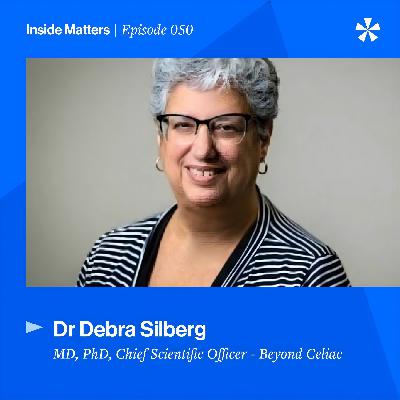
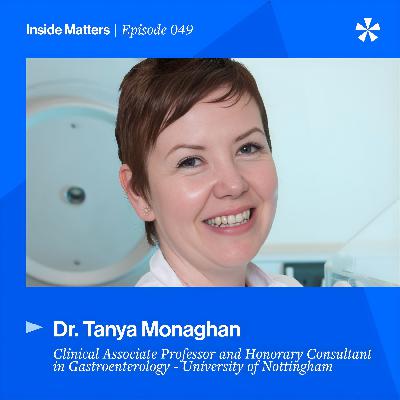






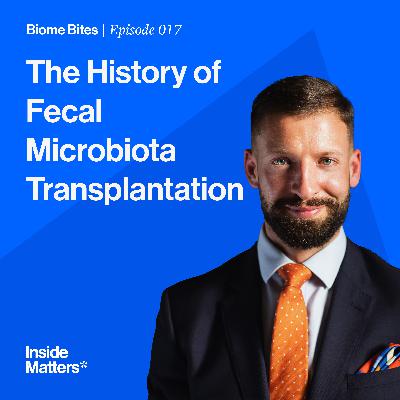
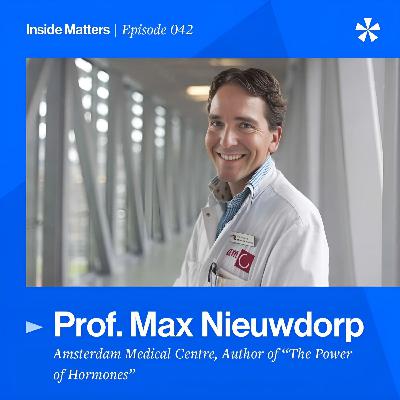

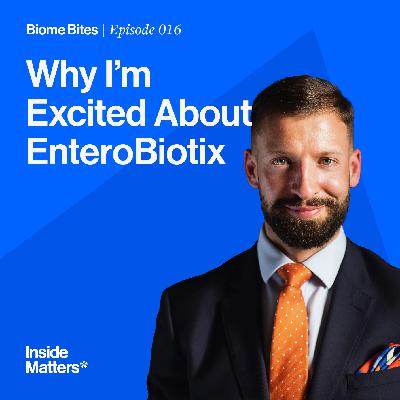
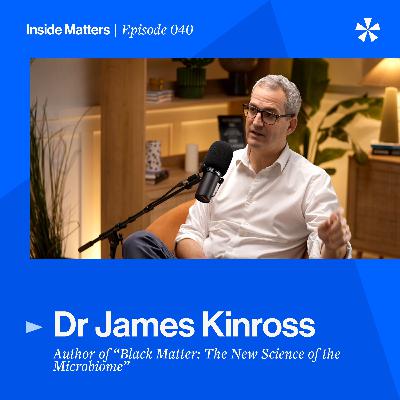
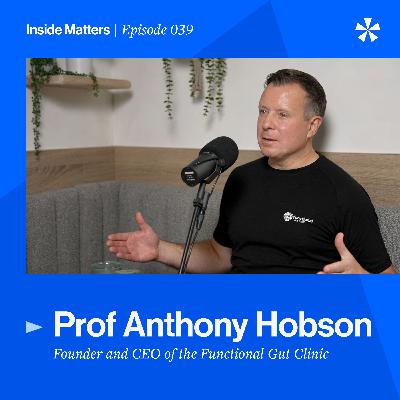









great!